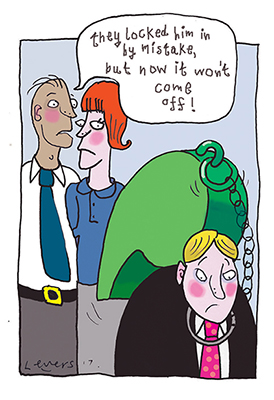NHS whistleblowers need protection – but so do victims of malicious complaints
In today’s NHS, we know it’s crucial to protect people who raise the alarm about poor patient care or incompetent staff. But it’s just as vital to avoid giving cover to people with axes to grind – as one innocent NHS manager discovered.

Until recently, I had a good career and an unblemished record as an NHS manager: I had spent three decades working my way up to a responsible senior job in a hospital trust. Then one morning I was summoned to see the chair, who handed me an envelope and had me escorted off the premises. What happened next was a miscarriage of justice that wrecked my career, did huge damage to my family, and cost the NHS an experienced manager. We have to find a better way to handle these matters.
Three whistleblowers had made allegations about me and several other executives: I was accused of lacking integrity, being dishonest and negligent, bullying, and misusing funds. I was sent home whilst an exhaustive investigation was launched, and entered a process of slow torture.
I wasn’t allowed to talk to anyone in the trust, so I felt very isolated. People always think there’s no smoke without fire, and I started to think that people in my community were giving me a wide berth, which was very upsetting. It was several months before I was interviewed, and then I was questioned for hours. I felt bullied, intimidated and powerless; I ended up taking medication for high blood pressure and anxiety.
After more than a year, I was completely exonerated: “no case to answer”, the investigators said. The trust’s statement explained that three people would face disciplinary action, while the fourth – me – would “return to work”. But it’s not that simple.
My wife had kept the family going whilst I struggled through the investigation. But when the decision came through, she broke down; she was so angry about what we’d been put through. The handling of the announcement didn’t help: it was several weeks before the trust issued a press release and a staff email naming me as innocent, and no apology was offered.
The trust required taxpayers to pay hundreds of thousands of pounds for legal advice, whilst I had to borrow to pay legal bills I’d incurred challenging errors in their handling of the investigation. But the trust maintains it was my decision to seek advice, so they won’t cover my costs. Their attitude was: “You’ve kept your job: what’s the problem?”
Indeed, I did have a job – but everything had changed: my office, my role and my boss were all different. And because the whistleblowers had retained their anonymity, I constantly wondered if my colleagues were among my accusers. I might have been sitting next to one of them. I’d lost all trust in those around me.
So I found it very hard to go back, and I had bad days there. I was suffering from depression, and eventually I was offered a secondment out of the trust. My new role is helping me to recover – but the horrible experience of being investigated, and the insensitive way in which I was brought back into the trust, had a huge effect on me. The damage has been done, and I don’t think I could ever be as committed or effective in an NHS job again.
I’ve written whistleblowing policies myself, and know how important it is to give people a safe way to report legitimate concerns. But the trust’s current policy allows people to lie maliciously about their colleagues without ever being held to account. And there’s no support for innocent victims: I was treated from the start as if I was guilty, and when I was exonerated no effort was made to restore my good name.
It takes courage to speak out about bad practice in the NHS, and we’ve a long way to go in terms of giving people the confidence to raise the alarm. But meanwhile, we need to protect the innocent victims of malicious accusations. The trust is consulting on a new whistleblowing policy – but it does nothing to encourage whistleblowers to ensure that allegations are well-founded, or to hold accountable those who use the system to settle scores.
For the foreseeable future, the NHS has lost a hard-working and experienced manager. What matters now is that no innocent NHS employee ever has an experience like mine again. But as things stand, sadly, that’s far from guaranteed.
The Sharp End is your chance to tell politicians and civil servants how their policies affect your work and your organisation. A version of this story was also published in the Guardian. To work with a reporter on your own story, email editor@healthcare-manager.co.uk. When requested, anonymity is guaranteed.
Related News
-

NHS job cuts: you’ll never walk alone
As the NHS redundancies in England loom, Rhys McKenzie explains how MiP will back you, and how members supporting each other and acting collectively is the best way to navigate this difficult process.
-

What now? Seven expert takes on the Ten-Year Plan
The government’s Ten-Year Plan for the NHS in England has met with enthusiasm and exasperation in equal measure. We asked seven healthcare experts to give us their considered view on one aspect that interests, excites or annoys them.
-

NHS job cuts: what are your options?
When politicians start reforming the NHS, there is only one certainty: some people will lose their jobs. But what options might be on the table and how does redundancy work? Corrado Valle explains.